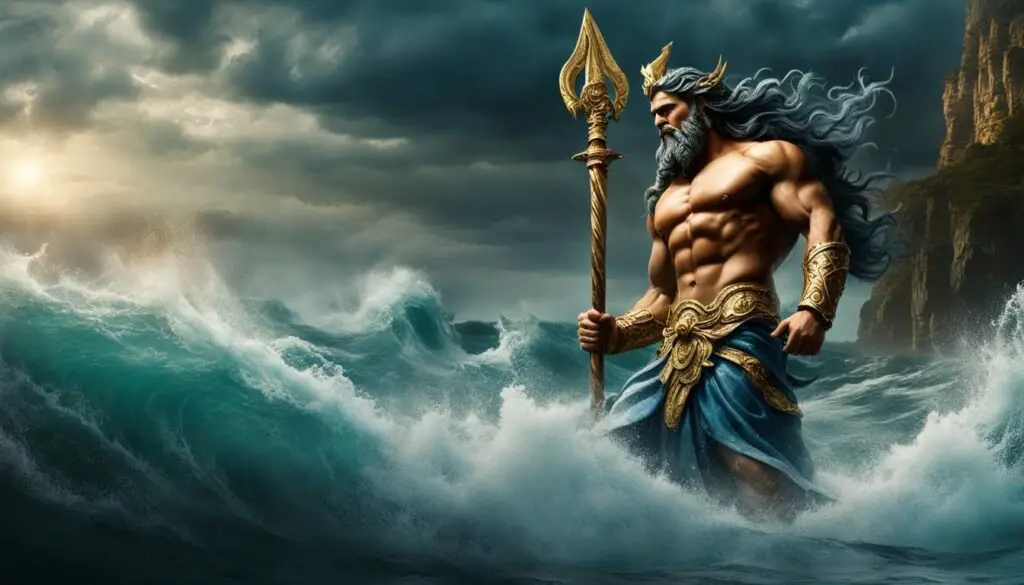In Greek mythology, Poseidon is known as the “God of the Sea” and possesses a vast array of powers and abilities. As one of the Big Three gods, he holds a prominent role in Greek culture and mythology. Let’s explore the powers and attributes that make Poseidon a formidable deity in Greek mythology.
Key Takeaways:
- Poseidon is the Greek god of the sea, storms, earthquakes, droughts, floods, and horses.
- He has the ability to control and command the forces of nature, creating waves, storms, and even tsunamis.
- Poseidon can cause earthquakes and shatter objects with his trident, earning him the title “Earth-Shaker” and “Storm-Bringer.”
- His main domain is the ocean, where he reigns supreme and governs over all aquatic life.
- Aside from his powers, Poseidon is also known for his physical prowess and his role as the father of many notable children.
Overview of Poseidon’s Powers
Poseidon, the powerful Greek god of the sea, possesses a myriad of extraordinary abilities that establish his dominion over the ocean and its elements. With absolute control over water, Poseidon can summon mighty waves, turbulent storms, and tempestuous whirlpools at will. He can also manipulate the seas, calming its turbulent currents or conjuring devastating tidal waves with a mere gesture. His powers extend beyond water, as he is known as the formidable “Earth-Shaker,” capable of causing earthquakes by striking the sea floor with his iconic trident.
Furthermore, Poseidon wields his trident with unrivaled strength and precision, enabling him to shatter any object or structure in his path. This divine weapon is a symbol of his authority and power, amplifying his abilities and granting him the ability to shape the very foundations of the earth. The god of the sea is also attributed with the creation of horses, fashioning these majestic creatures from the frothy sea foam.
Poseidon’s Powers at a Glance:
- Control over water and the ocean
- Manipulation of waves, storms, and whirlpools
- Ability to cause earthquakes
- Destruction of objects with his trident
- Creation of horses from sea foam
- Supernatural strength and physical prowess
With his extraordinary powers, Poseidon holds a prominent position among the Greek gods and plays a vital role in shaping the myths and stories of ancient Greece.
Appearance of Poseidon
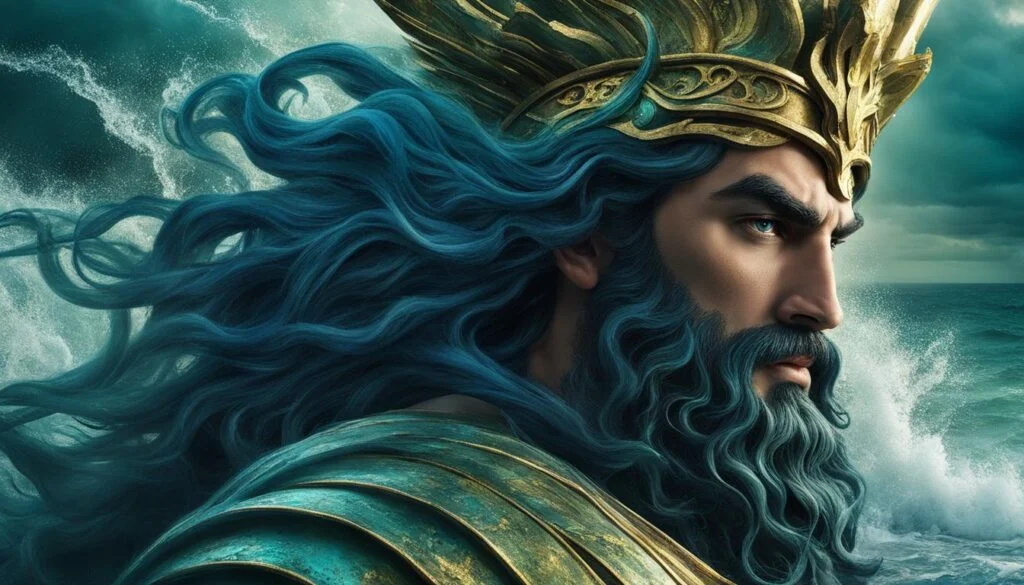
Poseidon’s appearance in Greek mythology is described as both powerful and captivating. He stands tall with a commanding presence, exuding strength and authority. His black hair and neatly trimmed black beard add to his striking appearance. Poseidon’s deep tan and sea-green eyes reflect his close connection to the ocean, emphasizing his role as the god of the sea.
When it comes to fashion, Poseidon dons elegant robes made of fine silk, showcasing his regal status. His attire is adorned with exquisite jewelry encrusted with precious gems, further emphasizing his divine nature. It is not uncommon to see Poseidon wearing a crown, symbolizing his reign over the seas. Additionally, he is often depicted carrying his iconic trident, a symbol of his power and dominion over water.
With his regal features and majestic presence, it’s no wonder Poseidon is often portrayed as a figure of awe and admiration in Greek mythology.
Poseidon’s Attributes:
- Tall and powerful
- Black hair and neatly trimmed black beard
- Deep tan and sea-green eyes
- Wears elegant robes and jewelry
- Often seen wearing a crown
- Carries his trident
Greek God Poseidon: Exploring His Fascinating Personality
When it comes to Greek mythology, the god Poseidon is an intriguing character with a multifaceted personality. Known as the god of the sea, Poseidon holds great power and influence over the vast ocean waters. But what lies beneath the surface of this mighty deity? Let’s delve into the personality traits that define Poseidon and make him a captivating figure in Greek mythology.
A Caring and Human Personality
Unlike some other gods, Poseidon is often regarded as benevolent and caring. He deeply cares for his children and watches over them, offering guidance and protection. This demonstrates a more human aspect to his personality, as he shows affection and concern for his family. Poseidon’s sense of humor further adds to his relatable character, making him more approachable in the eyes of mortals.
Moody and Vengeful
While Poseidon may possess a caring nature, he also has a darker side. Like many gods, he is known to be moody and can unleash his wrath upon those who anger or defy him. This vengeful aspect of his personality serves as a reminder of the consequences mortals face when crossing the gods. However, Poseidon can be calmed down by his sister Hestia, and he shares a deep and loyal relationship with her.
Protective of His Followers
Poseidon not only cares for his children but also looks out for his followers. Sailors and fishermen often invoke and worship him for protection during their journeys at sea. Poseidon grants safe passage to those who respect him and grants blessings related to marine trade and travel. This protective nature further solidifies his role as a powerful and influential deity in Greek mythology.
As we explore the depths of Poseidon’s personality, we discover a multifaceted god with both benevolent and vengeful traits. His caring and human side make him relatable, while his vengeful nature serves as a cautionary reminder of the gods’ power. Ultimately, Poseidon’s protective nature toward his children and followers cements his place as one of the most fascinating and influential deities in Greek mythology.
Powers and Abilities of Poseidon
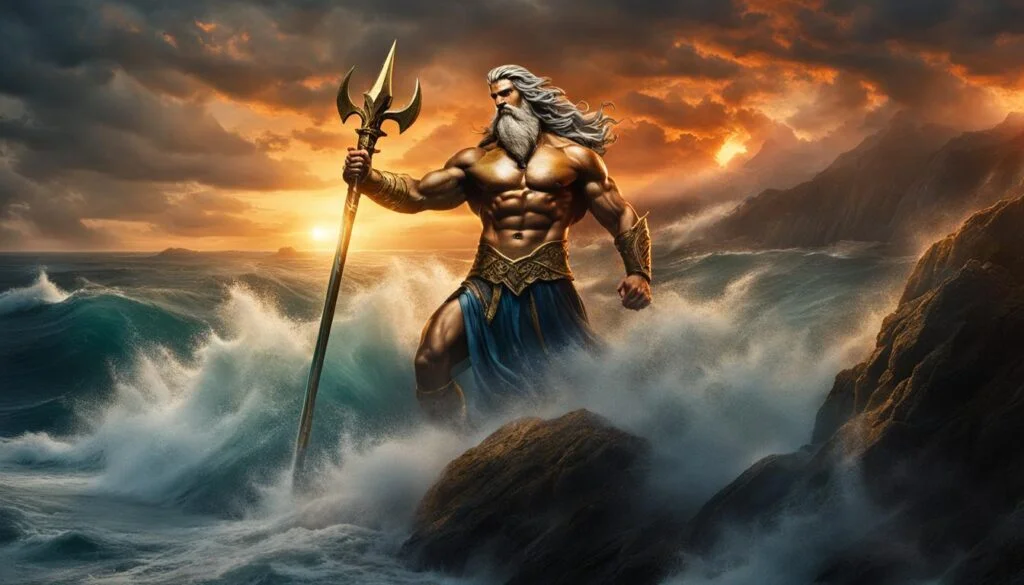
Poseidon, the Greek god of the sea, possesses immense powers and abilities that make him a formidable deity in Greek mythology. As the god of the sea, Poseidon has complete and divine control over all bodies of water and everything within them. He can create and manipulate powerful waves, storms, and whirlpools, bringing chaos to the oceans at will. With his trident, he can shatter objects and cause devastating earthquakes, earning him the title of “Earth-Shaker.”
Not limited to the sea, Poseidon’s powers extend to freshwater as well. He has dominion over lakes and rivers, allowing him to manipulate their flow and control their currents. Poseidon’s abilities also encompass the ability to influence and control marine life. He can communicate with and command all forms of sea creatures, from the smallest fish to the mightiest whales. This power grants him not only insight into the underwater world but also the ability to summon and direct oceanic creatures for his purposes.
Poseidon’s powers also extend to the creation of natural disasters. He can summon and control powerful storms, including tidal waves and hurricanes, wreaking havoc on the mortal world. Additionally, Poseidon possesses incredible physical strength and endurance. He can submerge entire islands, hurl mountains at his enemies, and transform into a physical body made up of water. These abilities make him a force to be reckoned with and a god to be respected in Greek mythology.
The powers and abilities of Poseidon include:
- Complete control over the sea and its forces
- The ability to create waves, storms, and whirlpools
- Divine control over freshwater bodies such as lakes and rivers
- Command and influence over marine life
- Creation and control of natural disasters, including storms and tidal waves
- Immense physical strength and endurance
Poseidon’s Weaknesses
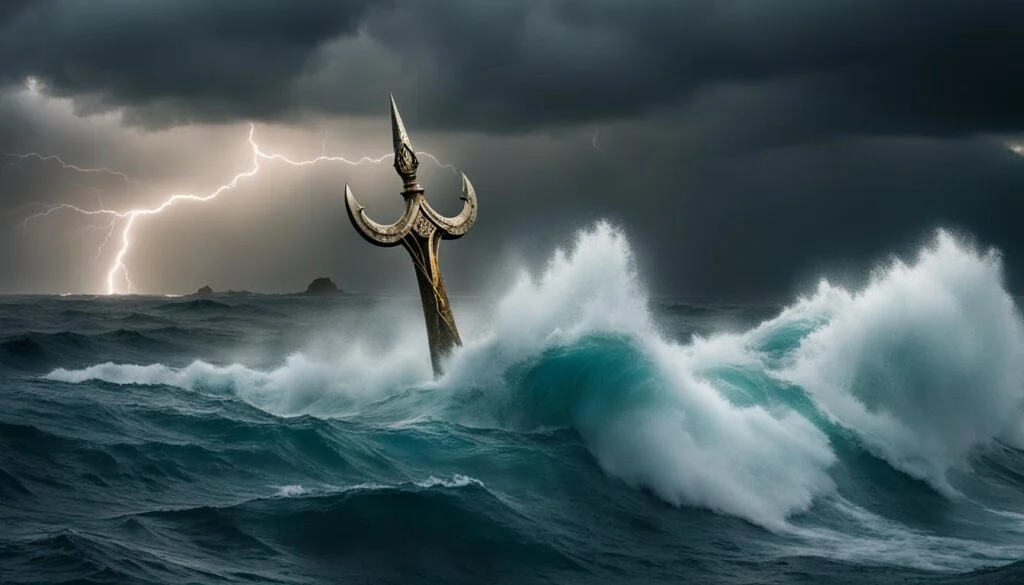
In Greek mythology, Poseidon is a powerful god with a wide range of abilities. However, even the mighty Poseidon has his weaknesses.
1. Demigod Children
One of Poseidon’s greatest weaknesses is his deep love and affection for his demigod children. While he cares deeply for them and tries to protect them, he is bound by certain rules and cannot make direct contact with them. This vulnerability leaves his children susceptible to the dangers of the mortal world, and Poseidon must rely on other means to ensure their safety.
2. Vengefulness and Moodiness
Despite his benevolence, Poseidon can be vengeful and moody. When angered or defied, he has been known to unleash his wrath upon those who have crossed him. His temperamental nature can make him unpredictable and dangerous, and it is wise to tread carefully when dealing with the powerful sea god.
3. Dependence on Hestia’s Calming Influence
Poseidon’s sister, Hestia, plays a crucial role in tempering his anger and calming him down. When Poseidon becomes enraged, Hestia has the ability to soothe his temper and bring him back to a more reasonable state. Without her calming influence, Poseidon’s wrath could be unleashed without restraint.
Despite these weaknesses, Poseidon remains a formidable and revered deity in Greek mythology. His powers and abilities far outweigh his vulnerabilities, and he continues to hold a significant role in the pantheon of gods.
Poseidon’s Role in Greek Mythology
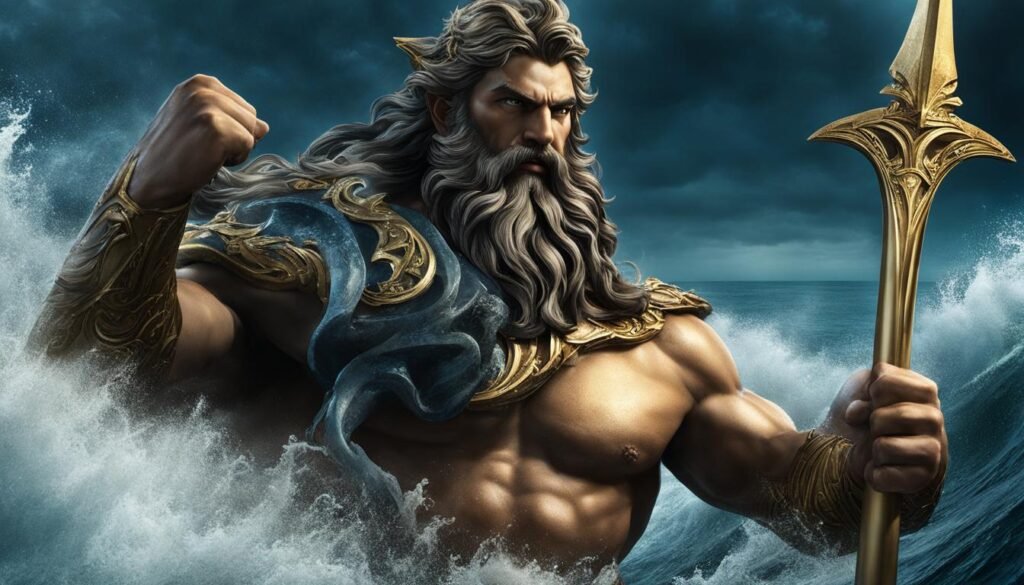
Poseidon, known as the Greek god of the sea, holds a significant role in Greek mythology. His powers and influence extend beyond just the ocean, as he is also associated with storms and earthquakes. Poseidon is often invoked by sailors and fishermen for protection during their voyages at sea.
One of the most famous myths involving Poseidon is his punishment of Odysseus. When Odysseus blinded Poseidon’s son, Polyphemus, the god of the sea unleashed his wrath upon the hero by throwing storms and waves at his ship, prolonging his journey back home. This story exemplifies Poseidon’s power over natural elements and his ability to shape events.
Another notable aspect of Poseidon’s mythology is his rivalry with Athena. Both deities vied for the patronage of Athens, resulting in a competition to prove their worth. Ultimately, the city chose Athena as its patron goddess, but Poseidon’s involvement in this story highlights his importance in the religious and cultural aspects of ancient Greece.
Poseidon’s Powers in Greek Mythology:
- Control over the sea, storms, and earthquakes
- Ability to create waves, storms, and tsunamis
- Power to cause earthquakes and shatter objects with his trident
- Creation of horses from sea foam
- Divine control over water and ability to extinguish Hestia’s flames
Poseidon’s tales and legends are intertwined with the natural world, showcasing his power and influence over the elements. Whether it is through his creation of horses, his role in famous myths, or his rivalry with other gods, Poseidon’s presence in Greek mythology is undeniable. He remains a revered and formidable deity, embodying the awe-inspiring forces of the sea.
Poseidon’s Relationships and Children
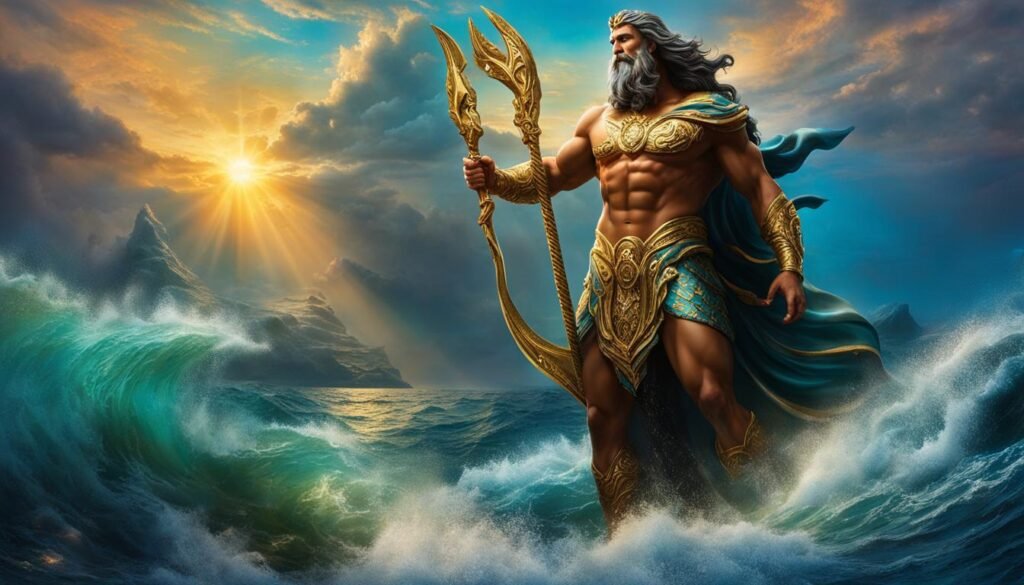
Poseidon, the mighty Greek god of the sea, is not only known for his powers and abilities, but also for his relationships and children. Let’s take a closer look at the familial connections and offspring of this revered deity.
Marriage and Offspring
Poseidon is married to Amphitrite, the sea goddess, and together they have a son named Triton. Triton is often depicted as a merman, with the upper body of a human and the lower body of a fish. He is associated with the sea and is known as a herald for his father.
In addition to Triton, Poseidon had a daughter named Rhodos with the goddess Aphrodite. Rhodos later became the namesake of the island of Rhodes in the Mediterranean Sea.
Notable Children and Connections
Poseidon’s lineage includes several legendary figures and creatures. He is the father of Theseus, the hero known for defeating the Minotaur in the labyrinth of Crete. Theseus is recognized as one of the greatest Greek heroes and a symbol of courage and intelligence.
Another notable child of Poseidon is Orion, a skilled hunter who became a constellation in the night sky. Orion’s tales often revolve around his incredible strength and his hunting prowess.
Furthermore, Poseidon is associated with the birth of the winged horse Pegasus. According to myth, Pegasus emerged from the severed head of the monstrous Gorgon Medusa when Perseus slew her with the help of Athena. Pegasus went on to become a loyal companion to heroes such as Bellerophon.
These are just a few examples of Poseidon’s relationships and children. His connections in Greek mythology not only add depth to his character but also illustrate his significant role within the pantheon of gods.
Legends and Stories of Poseidon
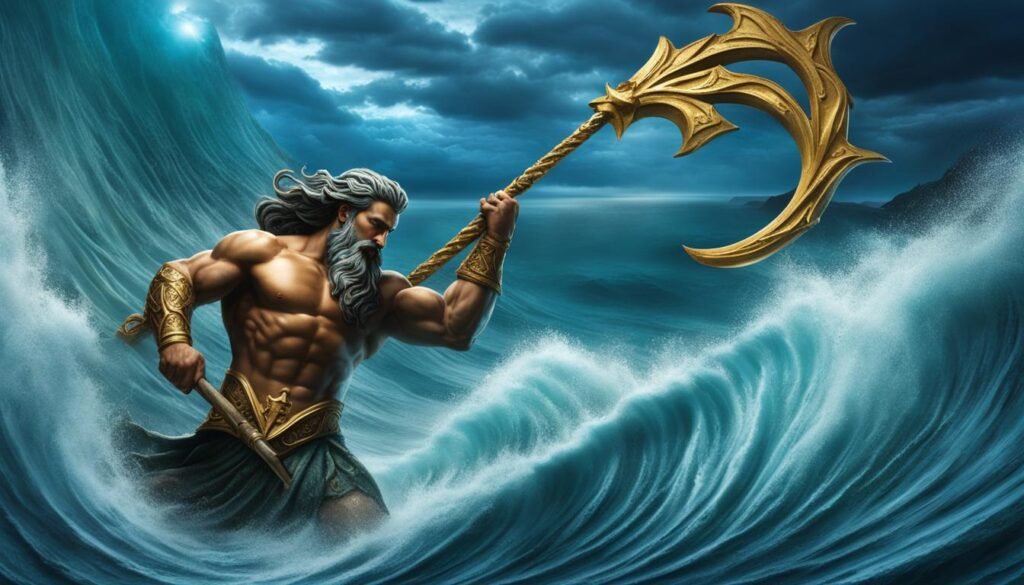
Poseidon, the mighty Greek god of the sea, is surrounded by countless legends and stories that showcase his immense power and influence. These tales have been passed down through generations, captivating imaginations and revealing the depths of Poseidon’s character. Let us delve into some of the most fascinating legends and stories associated with this legendary deity.
Poseidon and the Creation of the Horse
One of the most well-known myths involving Poseidon revolves around the creation of the horse. Legend has it that Poseidon struck the ground with his trident, causing a spring to spring forth. This spring produced a magnificent horse, known as the first horse, from the foam that rose to the surface. This remarkable creature swiftly became one of Poseidon’s most revered and beloved creations, forever tying him to the equestrian world.
Poseidon’s Rivalry with Athena for Athens
An epic rivalry unfolded between Poseidon and Athena, the goddess of wisdom, over the patronage of the city of Athens. Seeking to win the favor of the Athenians, Poseidon thrust his trident into the rock of the Acropolis, causing a saltwater spring to gush forth. However, Athena, in her wisdom, gifted the Athenians with an olive tree, a symbol of prosperity and peace. Impressed by the olive tree’s utility and symbolism, the Athenians chose Athena as their patron deity, leaving Poseidon in a state of eternal rivalry with the city.
Poseidon’s Wrath and Divine Punishment
Poseidon, like many gods of ancient Greek mythology, had a vengeful side that he unleashed upon those who dared to anger or defy him. One notable example is the story of Odysseus, who blinded Poseidon’s son, Polyphemus, the cyclops. Seeking retribution, Poseidon unleashed furious storms and massive waves to torment Odysseus and his crew during their perilous journey back home. This tale serves as a cautionary reminder of Poseidon’s wrath and the consequences of challenging his authority.
These are just a few examples of the countless legends and stories that bring Poseidon to life in Greek mythology. Each tale adds depth and meaning to his character, highlighting his power over the sea, his divine rivals, and the consequences one faces when crossing paths with the mighty God of the Sea.
Conclusion
In conclusion, Poseidon, the Greek god of the sea, is a powerful deity with a vast array of abilities. He holds dominion over the ocean, storms, earthquakes, and horses, and can control and manipulate these forces at will.
With his trident in hand, Poseidon can create powerful waves and storms, and even cause devastating earthquakes. His command over water is unmatched, allowing him to calm the seas or unleash destructive tidal waves. Poseidon’s appearance, described as tall, handsome, and regal, adds to his commanding presence as a god.
While he possesses incredible strength and power, Poseidon also exhibits a human-like personality. He cares deeply for his children and is protective of them, offering guidance and support. However, he can be vengeful and moody, unleashing his wrath upon those who anger or defy him.
Overall, Poseidon plays a significant role in Greek mythology, with his stories and legends reflecting the power and importance of the sea in ancient Greek society. As the god of the sea and its natural phenomena, Poseidon remains a revered and formidable deity in Greek culture.
FAQ
What powers does Poseidon have in Greek mythology?
Poseidon has the power to control and command the forces of nature, create and manipulate water, cause earthquakes, and shape-shift into various forms.
What are Poseidon’s abilities?
Poseidon can create waves, storms, and tsunamis, shatter objects with his trident, manipulate marine life, influence mammals, control lakes and rivers, generate tidal waves and storms, and transform into a physical body made up of water.
How does Poseidon appear in Greek mythology?
Poseidon is described as tall, handsome, and powerful, with black hair, a neatly trimmed black beard, a deep tan, and sea-green eyes. He wears robes made of fine silk, elegant jewelry encrusted with precious gems, and often carries a crown and his trident.
What is Poseidon’s personality like?
Poseidon has a caring and human personality compared to other gods. He is protective and loyal to those he cares about, has a sense of humor, but can also be vengeful and moody at times.
What are Poseidon’s weaknesses?
Poseidon’s greatest weaknesses are his demigod children, and he is bound by certain rules that prevent him from making direct contact with them. He can also be calmed down by his sister Hestia.
What is Poseidon’s role in Greek mythology?
Poseidon plays a central role in Greek mythology, especially in stories relating to the sea, storms, and earthquakes. He is often invoked and worshipped by sailors and fishermen for protection and blessings related to marine travel and trade.
Who are Poseidon’s relationships and children?
Poseidon is married to the sea goddess Amphitrite, has a son named Triton, and had a child with the goddess Aphrodite named Rhodos. He is the father of many other notable children, including the hero Theseus, the hunter Orion, and the cyclop Polyphemus.
What are some legends and stories involving Poseidon?
Poseidon is involved in several famous myths, such as the punishment of Odysseus for blinding his son Polyphemus by throwing storms and waves at his ship. He is also known for his rivalry with Athena and his creation of horses.
Conclusion
Poseidon, the Greek god of the sea, possesses a wide range of powers and abilities. He is a central figure in Greek mythology, worshipped and invoked by sailors and fishermen, and his stories shape the understanding of the power of the sea in ancient Greek society.


